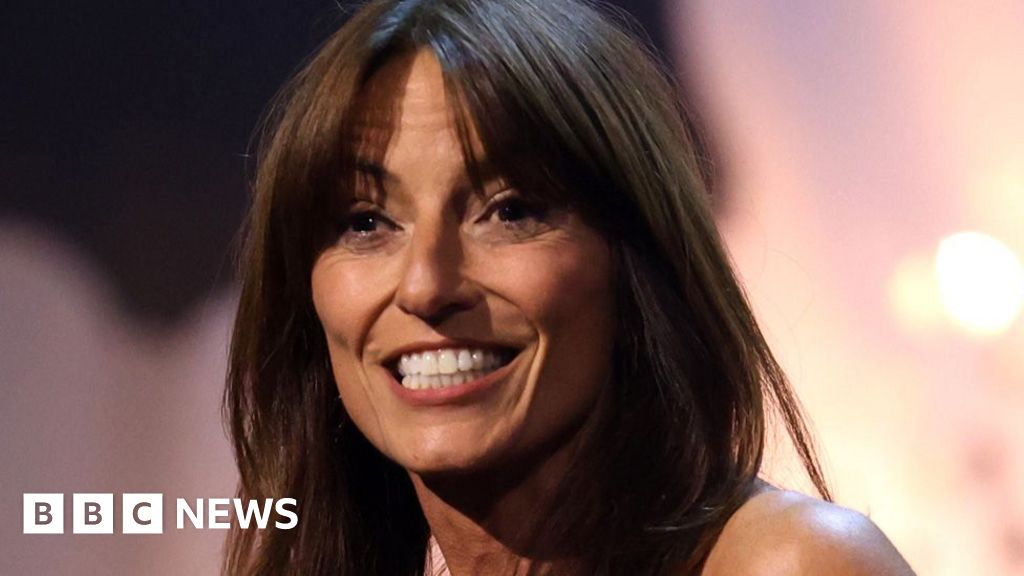ARTICLE AD BOX
By Helen Bushby
Entertainment reporter
Image source, Getty Images
Image caption,Sandra Oh says we should "normalise" girls having periods in films
"Hey, all girls have periods. So let's normalise that - and celebrate it!"
Killing Eve star Sandra Oh is pretty choosy about her roles - but she tells the BBC she jumped at voicing a character for Pixar's latest film Turning Red.
It tackles blushing, big emotions and, yes, periods.
"I was just so happy there was a film about it," Oh continues.
"Storytelling wise, I don't think we really mention it enough, so to be a part of a film that embraced puberty was important to me."
'Poofs' into a panda
She plays Ming, the mother of 13-year-old Mei, a diligent, slightly nerdy Chinese-Canadian schoolgirl.
Mei is navigating her life pretty well, at least until she's hit with a rush of hormones.
This can be derailing at the best of times, but whenever Mei feels overwhelmed or something makes her feel uncomfortable, she "poofs" into a giant red panda.
The chaotic consequences are a direct metaphor for the reality young girls can face, as they are hit with some pretty big physical and mental changes.
Image source, Pixar
Image caption,Mei's friends are really supportive of her panda predicament
Rosalie Chang plays Mei, whose panda alter-ego is a bit like a more cuddly version of the Incredible Hulk.
Chang said the film resonated with her in real life.
"I went through puberty throughout this film," she explains - and unlike her character, she says it without a hint of embarrassment.
"I mean, I was 12 when I started it, and I'm now 16. This film is unapologetic about tackling puberty. It's not trying to hide, it's not trying to be wishy washy. It just says it straight up.
"It's a really taboo subject, even though everyone goes through it."
Image source, Pixar
Image caption,Learning to adapt to a new body makes for some comedic moments in the film
Chang saw the clumsy, emotional panda as a "metaphor for change and messiness".
"It's so similar, yet different from me - she growls a little more, she has bigger outbursts," she laughs.
Although Pixar has explored a young girl's emotions in Inside Out, along with mother-daughter tensions in Brave, Turning Red is its first foray into puberty. It's not a theme that crops up very often in family films.
Director Domee Shi says the idea of including periods and the embarrassment girls can feel was "there from the very beginning".
The film touches on menstruation very gently, and Mei is particularly embarrassed by her mother's response.
"It didn't feel right if we didn't talk about it," says the film-maker, who won 2019's short animation Oscar for Bao, and co-wrote Turning Red with Julia Cho.
Producer Lindsey Collins adds they tested out responses to the film during early screenings for Pixar colleagues.
"Just getting the reaction from the crowd of laughter and shock - it was the best response we could get," she says.
Carolyn Danckaert, founder of the website A Mighty Girl, which includes advice for girls and parents about periods, tells the BBC that many parents "struggle to initiate conversations with their kids on topics like puberty and periods, which tween girls often find embarrassing".
"When you watch a movie together, however, you can use the character's experience as an opportunity to broach these subjects with a little emotional distance that can put kids at ease."
Image source, Getty Images
Image caption,Research suggests some girls miss school because of their period
Emma Thompson O'Dowd, health and wellbeing specialist at global children's charity Plan International UK, calls the inclusion of periods in the film "wonderful".
Their research suggests that "when girls first start their period, over two-fifths feel anxious, and a third feel embarrassed".
"Nearly two million UK girls have missed a part day or full day of school because of their period, many out of fear of experiencing leaks," she adds.
"All children, but especially girls, need to learn that periods are a healthy and normal part of life. Films like Turning Red help can smash the taboos around periods, and create opportunities for open and honest conversations."
Image source, Getty Images
Image caption,Turning Red's line-up: Director Domee Shi, Sandra Oh, Rosalie Chang and producer Lindsey Collins
This film is also notable as the first Pixar movie directed solely by a woman - with an all-female key filmmaking team and an Asian-led cast.
Interestingly, Chang didn't notice this; to her it was just film-making which happened to be done by women.
"I didn't even realise it was all-female leadership until the wrap party when I first saw the movie," she says, while Oh adds: "There are a lot of firsts with Turning Red, and I think all those should be celebrated."
Pixar, which was bought by Disney in 2006, has made films including The Incredibles, Toy Story and Finding Nemo, and has won numerous awards including 18 Oscars.
Collins said the female crew felt very supported by Pixar's executives, who did not get cold feet about the film's subject matter.
She added that being all-female "gave us permission to stay bold".
"When we were talking about cringey, awkward moments in the story, you could have had a bunch of people going 'I don't know about that part...' but instead, you were surrounded by women going 'Oh my gosh, that totally happened to me'."
Director Domee Shi wanted to depict life in a Chinese-Canadian home, "making dumplings with your mom as your dad makes a meal"
Turning Red is also part of a surge in popularity for Asian-led films and TV shows, including Oscar-nominated Drive My Car and Raya and the Last Dragon, along with Oscar-winning Parasite and the hugely popular Squid Game, to name just a few.
Shi, who is Chinese-Canadian, talks about the importance of "being what you can see".
"There wasn't a lot of representation of myself and my family growing up, and I didn't get to see a lot of myself in media," she says.
"I really wanted to just share this Chinese-Canadian girl's experience with the world because it's so specific."
Oh, who is Asian-Canadian-American, told Elle Canada in 2020 she is "specifically interested in roles that explore a character's race".
"This is exactly the project that I was looking for," she says, clearly delighted there are now "more opportunities to tell stories I wasn't able to tell early on in my career".
Dr Martha M Lauzen, the founder and head of San Diego's Center for the Study of Women in Television and Film, tells the BBC: "The time is long overdue for a female-driven film, directed solely by a woman, from Pixar. It's great to see the studio betting on the promise of Domee Shi's previous unique and brilliant work, Bao."
Dr Lauzen adds that in 2020, Asians and Asian-Americans comprised 6% of all female characters in speaking roles in the top-grossing films, down from a historic high of 10% in 2018 [when Crazy Rich Asians pushed their representation to a historic high], according to the It's a Man's (Celluloid) World study.
"Due to films like Raya and the Last Dragon and Shang-Chi and the Legend of the Ten Rings, I expect the percentages of both female and male Asian and Asian-American characters to increase in 2021," she adds.
Image source, Pixar
Image caption,Mei sometimes finds her Mum extremely embarrassing, even though she's trying to help
Turning Red also focuses on mothers and daughters across the generations in Mei's family.
Ming wants her daughter to honour their traditions by working at the family temple, but resists Mei's urges to go out and be a typical teenager.
Oh talks about this sometimes tricky relationship, calling Ming "loving and hypervigilant", which is a pretty accurate description.
"I don't know one person who doesn't have some sort of complicated relationship with their mother," she says. "We're not shying away from it. It's a loving place, but it's also a complicated time in a in a young person's life."
Shi adds there were a lot of people on the crew of Asian or immigrant backgrounds, with "similar stories of feeling that pressure and tension with their moms and parents".
"It was really important for us to tell this nuanced story," she explains.
"Mei genuinely loves her mom and wants to be a good daughter, but she's growing up in a world that's very different from her parents."
Image source, Pixar
Image caption,Mei and her school friends are keen to become more independent
Mei finds the film's boyband 4*Town particularly enticing, and along with hordes of other teenagers, is desperate to go to their concert.
"Unfortunately it doesn't align with what Ming thinks is best or appropriate," says Chang, while Collins adds: "When you're 13, going to your first concert is life or death - it's a big deal."
Although 4*Town are fictional, their three songs in the film were written by none other than pop star Billie Eilish, and her musician brother Finneas O'Connell, who also jointly wrote the Bond theme for No Time to Die.
Collins explains they approached them because "there's something about being able to speak to a generation".
Image source, Getty Images
Image caption,Billie Eilish agreed to co-write 4*Town's songs
"My kids are big music lovers, and in 2016, they were constantly playing Ocean Eyes by Billie Eilish, so clearly it spoke deeply to them," she adds.
But despite the appeal of 4*Town, it's really the giant red panda which takes centre stage in this film.
Given the option to decide on her own spirit animal, what would Oh choose?
"I do love the idea of being able to soar and fly, but not like a teeny bird....
"I'd be a killer bird," she says with a chuckle.
That could be another film entirely - perhaps one about the menopause.
Turning Red is streaming on Disney+ on 11 March.

 2 years ago
65
2 years ago
65








 English (US)
English (US)